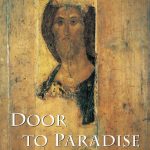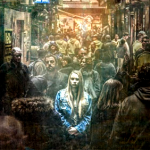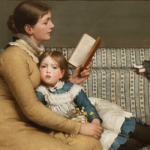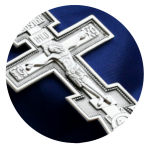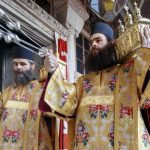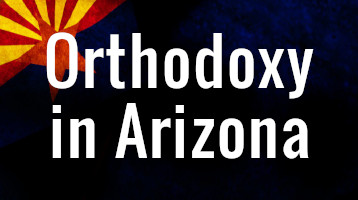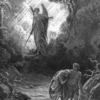Two of our most popular booklets, the ASONA Prayerbook and the Door to Paradise, are back in stock at ASONA. The ASONA Prayerbook is, of course, our parish published Orthodox Prayer book, containing all the necessary prayers for one's prayer rule, as well as a special prayer for peace, the Prayer Rule of St. Pachomius, and an Examination of Conscience in preparation for Confession. Prayerbooks are available for a donation of $10. The Door to Paradise is a booklet, published by St. Hermans Press, that we offer for free to first time visitors, or other visitors who have not had the chance to be offered a copy. It is an excellent introduction to the Orthodox faith and spiritual way of life. … [Read more...]
What Happens to Those Who Have Never Heard of Jesus?
What happens to those who have never heard of Jesus? Will God condemn people to hell for not believing in someone they have never heard of? First, people are not condemned to hell for not believing in Jesus whom they have never heard of. Rather they are already condemned because of their sin. Thus, the real question is not how can God send someone to hell, but how can God condescend to save any one of us? As Paul has so beautifully written in the book of Romans, "God shows his love for us in that while we were yet sinners Christ died for us. Since, therefore, we are now justified by his blood, much more shall we be saved by him from the wrath of God." (Romans 5:8-9). If ignorance were … [Read more...]
“God’s Wrath” Was Not Part of the Theology of Israel’s Sacrificial System
by Fr. Patrick Henry Reardon Adult converts to the Orthodox Church often remark on a sense of relief---not to say liberation---they felt when they became acquainted with Orthodoxy's teaching on Salvation. I have heard testimonies on this point times out of mind. These folks, coming mainly from Western Christian backgrounds, had previously thought about Salvation chiefly in forensic terms. They were accustomed to hearing the word "merit" a lot with respect to the Cross. Their former Soteriology might be summarized in Archbishop Cranmer's lines in The Book of Common Prayer, which declare that on the Cross Jesus Christ, "by his one oblation of himself once offered," made "a full, perfect, … [Read more...]
An Apologetic for Home Education in the 21st Century
By Allison Burr In the greatest of ironies, a recent issue of Harvard Magazine has condemned parents being at home with their children all day, even while the governments across America have now required it for the past several weeks due to the COVID-19 pandemic. My efforts to recast homeschooling in a less-threatening light are rooted in two things: teleology and practice. In the most recent issue of Harvard Magazine, Erin O’Donnell presents Dr. Elizabeth Bartholet’s arguments against homeschooling and her radical call to ban the practice entirely.* Dear me. My fellow 2 million homeschoolers and I must have unwittingly ruffled her feathers somehow, to be subjected to such … [Read more...]
Six Men Who FAILED to Paganize the Origins of Christmas
by John Sanidopoulos Every Christmas season, the usual myths are hauled out and distributed for popular consumption. You know them. We’ve all heard or read them. That Christmas celebrations were stolen from the Romans The Christmas tree is a pagan hangover That other gods had virgin births That Yule and the mistletoe are all about Odin These falsehoods are repeated often and loudly, under the guise of being “historical truths.” And strangely they still stump most Christians, who are then filled with doubt about what they believe. Of course, these myths were designed to elicit precisely this sort of reaction from believers. All of them were invented in the 18th- and … [Read more...]
On The Cross
by St. Theophan the Recluse The Lord accomplished our salvation by His death on the Cross: on the Cross He tore up the handwriting of our sins; through the Cross He reconciled us with our God and Father; and through the Cross He brought down upon us grace-filled gifts and all heavenly blessings. But this is the Lord’s Cross itself. Each of us becomes a partaker of its salvific power in no other way than through our personal cross. When the personal cross of each of us is united with Christ’s Cross, the power and effect of the latter is transferred to us and becomes, as it were, a conduit through which every good gift and every perfect gift (James 1:17) is poured forth upon us from the … [Read more...]
September is National Preparedness Month
National Preparedness Month (NPM) is recognized each September to promote family and community disaster planning now and throughout the year. As our nation continues to respond to COVID-19, there is no better time to be involved this September. 2020 is the poster child year for preparedness, and who knows what the rest of the year will bring. Therefore, as a public service, we are encouraging all of our parish members, catechumens, inquirers, and interested visitors - anyone and everyone - to take the time to make the most of National Preparedness month in their own households. Use this 'calendar' to complete your preps. Remember, it's better to have it and not need it, than need it and … [Read more...]
Building Community in the Early Church
by Fr. Lawrence Farley When was the last time you heard a sermon or read an article or blog post on Romans chapter 16? Apart from Rom. 16:1, which describes Phoebe as “a diakonos of the church which is at Cenchrea” (the darling verse of those advocating the restoration of an order of deaconesses), most people pretty much ignore the whole chapter, which consists largely of a list of names of people in the Roman church to whom Paul sends greetings. Greet Prisca and Aquila, greet Epaenetus, greet Mary, greet Andronicus and Junia, greet Ampliatus. The list goes on and on, and most people give it no more attention than they do names in a phone book. As far as most people are concerned, the … [Read more...]
Acedia: The Demon of Noonday, and the Name for How We’re All Feeling Right Now
by Jonthan Zecher Acedia: the lost name for the emotion we’re all feeling right now With some communities in rebooted lockdown conditions and movement restricted everywhere else, no one is posting pictures of their sourdough. Zoom cocktail parties have lost their novelty, Netflix can only release so many new series. The news seems worse every day, yet we compulsively scroll through it. We get distracted by social media, yet have a pile of books unread. We keep meaning to go outside but somehow never find the time. We’re bored, listless, afraid and uncertain. What is this feeling? John Cassian, a monk and theologian wrote in the early 5th century about an ancient Greek emotion … [Read more...]
“When It’s Safe” means NEVER
by Fr. Geoffrey Korz At every liturgy in the Orthodox Church, just before the singing of the Nicene Creed, the priest or the deacon intones the words, "The doors! The doors!" This call dates back to the earliest times, when the doors of the church had to be barred shut, to prevent outsiders (in those days, Roman soldiers) from entering the church, witnessing those who confessed the faith, seizing them, and killing them. Being a Christian was not safe. Centuries later, under the Muslim Turks, Crypto-Christians - those who lived publically as Muslims, but secretly as Orthodox Christians - attended Liturgy in secret churches, often hidden beneath secret doors in the floors of their own … [Read more...]
- « Previous Page
- 1
- …
- 16
- 17
- 18
- 19
- 20
- …
- 29
- Next Page »
